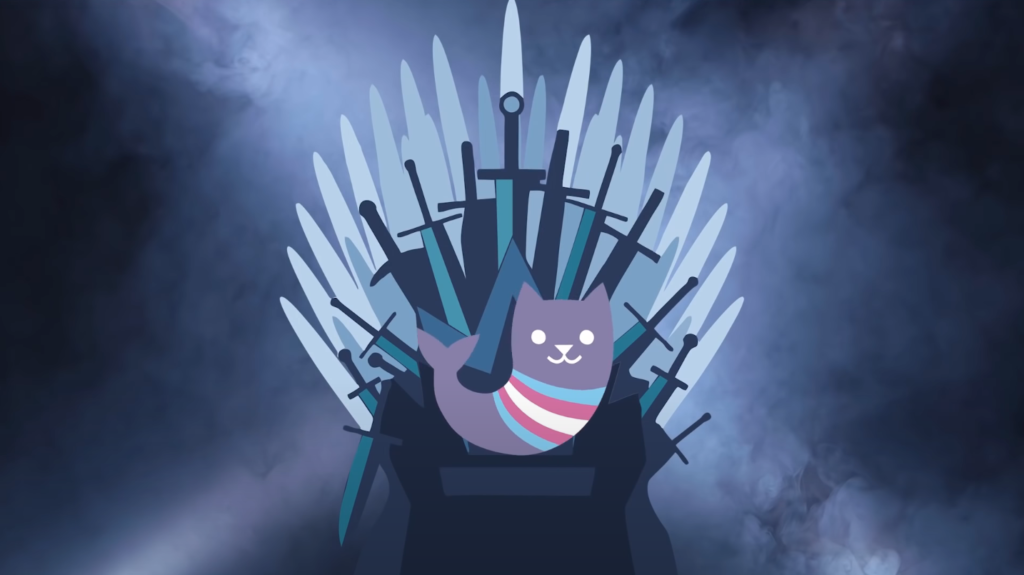When the context or legislation in a country don’t allow activists to talk about LGBTIQ+ related issues directly, they must look for creative ways of bypassing these restrictions. Here is a fun example from Russia where a Trans group decided to go for a complete “rebranding” while staying true to themselves.
How was the idea of this “rebranding” born?
In December 2022 a new anti-propaganda law was passed, which banned all public positive expression of LGBTQI+ topics. Breaches would result in heavy fines. Social media algorithms were set to search for LGBTIQ+ related content and hide them from feeds, so it was impossible to communicate on explicit LGBTQI+ language.
An obvious solution would have been to go “private”, and make our accounts accessible via log-in codes only, but this would have cut us off from the bulk of our community, who would not join such private accounts for fear of being outed.
So we had to find a way to remain public.
Tell us about the solution you found.
Censorship is very harmful for people. When you have to hide and self-censor for a long time, it destroys you from the inside. That’s why we needed to come up with something empowering and uplifting, to try to compensate the trauma.
We needed a new terminology that would be easily understandable and bantering at the same time. And so we came up with this idea of replacing the term ‘transgender’ with ‘kilkot’.
So who exactly is a kilkot?
“Kilkot” is a word in Russian that is made out of two words – fish and cat. It’s a chimera, half fish – half cat, a kind of cat-mermaid. Kilkots are obviously non-binary.

It was initially invented for our fifth anniversary. At the time, we made videos with it, created branded merchandise. The Kilkot was so cute that everybody liked it, and it became the mascot of our organisation, easily recognizable by our target audience.
We used it everywhere in our communications, when we created images for our posts on social media. It was very visible. At some point, we created its counterpart – the “Dropfish”. The Dropfish would ask difficult questions about transgender issues, and the Kilkot would joyfully answer them. The Dropfish is an avatar of a depressed person who easily gives up, while the Kilkot is a positive proactive transperson who overcomes challenges.

What was your “rebranding” strategy?
After the decision to “rebrand”, we created new accounts that would not feature the LGBTQI+ terminology.
This was of course extremely damaging for the access to all the content we had published during the 9 years we had serviced the community, which had to be moved to private accounts, which we then stopped managing.
On our new accounts, we explained that now we are Kilkots and invited people to join. We had a strict content-plan for several days. As a result, it took us three days to ‘move’ most of our audience.
Did the audience easily move from old accounts to the new ones?
We have a really loyal core audience who moved very quickly. But obviously we lost some people who only visit our accounts occasionally and don’t follow all the news. We still get messages like “Oh, and where are you? I can’t find your page anymore”.
The most active social media platform for us now is telegram. Because it’s more secure and user-friendly. We’ve noticed that people who had not followed us previously have joined our newly-created telegram channel. Instagram is also a great platform, but since there are problems with using it here in Russia, where Instagram is considered ‘extremist’ and can only be accessible using vpn, our audience there is not as active.
When we first started to invite people to join the Kilkots accounts, there were different reactions. Some people were not happy and accused us of condoning censorship. Those were mostly people who think that you should either speak openly in private chatrooms or leave Russia.

Apart from losing some audience, what other negative consequences did you face?
We lost all our published materials. We cannot repost them now since they contain LGBTIQ+ related vocabulary. We’re gradually ‘kilkotting’ them, meaning replacing all the transgender-related words with derivatives of ‘kilkot’. We even tell people during events: “Please ‘kilkot’ your presentation”.
Speaking about ‘kilkotting’ your content, is it your only way of communication now?
We now have three different communications tactics:
– During the ‘No Words’ campaign we introduced the black bands, and we continued using this way in our posts whenever it is impossible to use the ‘kilkot’-language (when it’s not appropriate or the topic is too serious).
– Neutral language. We just avoid using the ‘trigger’ words. Instead of “transgender community” we just write “community”, and so on.
– And the third tactic is the fun ‘kilkot’-language. We adapt many existing and important words. Instead of “transition” we say “kilkotition” or “transition from fish to cat”; instead of “coming-out”, we use “kilkot-out”, etc.
Can you share any recommendations for people from other countries with repressive legislation on how to keep talking about forbidden topics?
Be fun and creative!
If you are forced to hide or censor yourself, it shouldn’t look like a defeat, it should look like you are fighting back.

